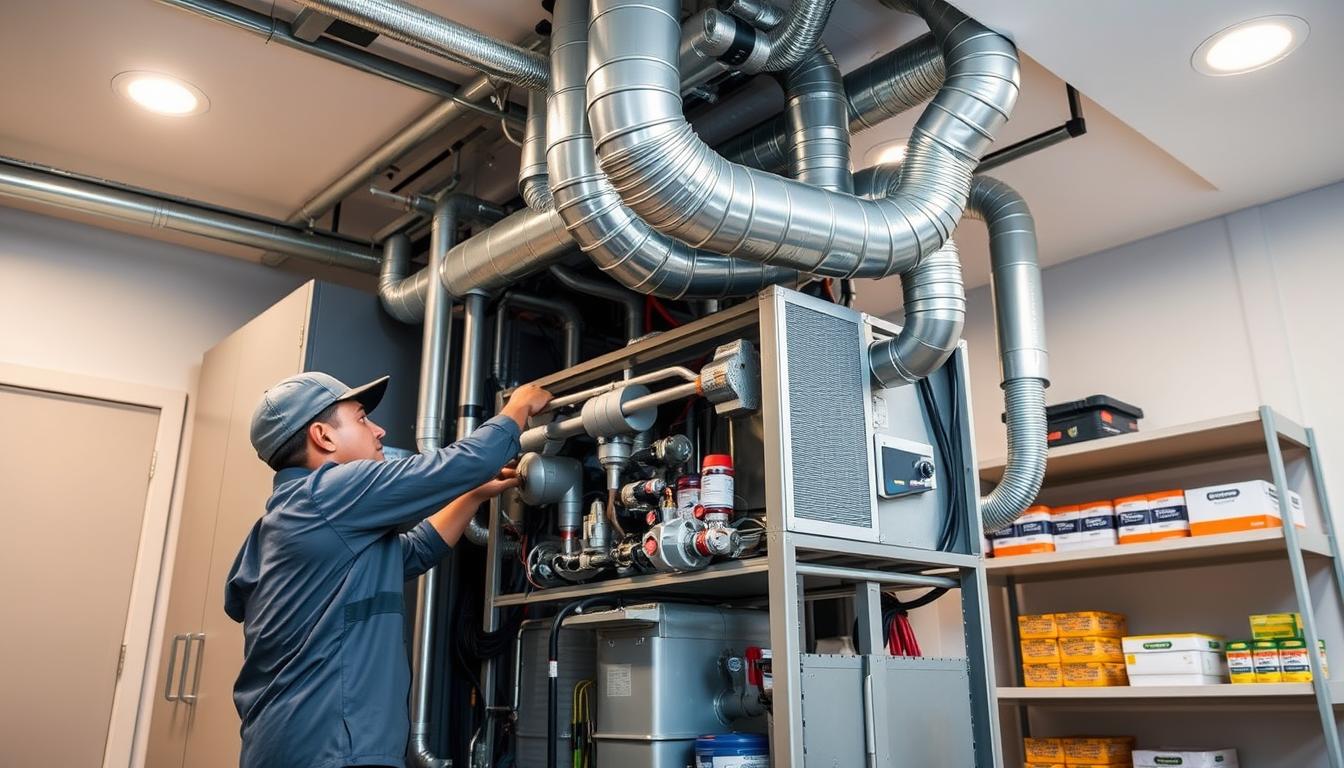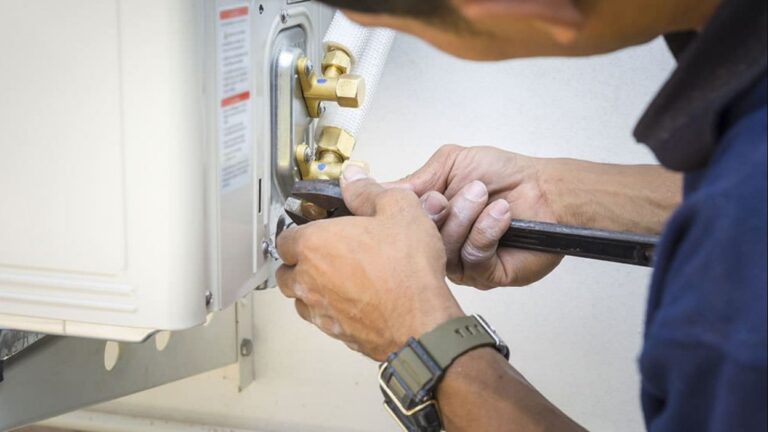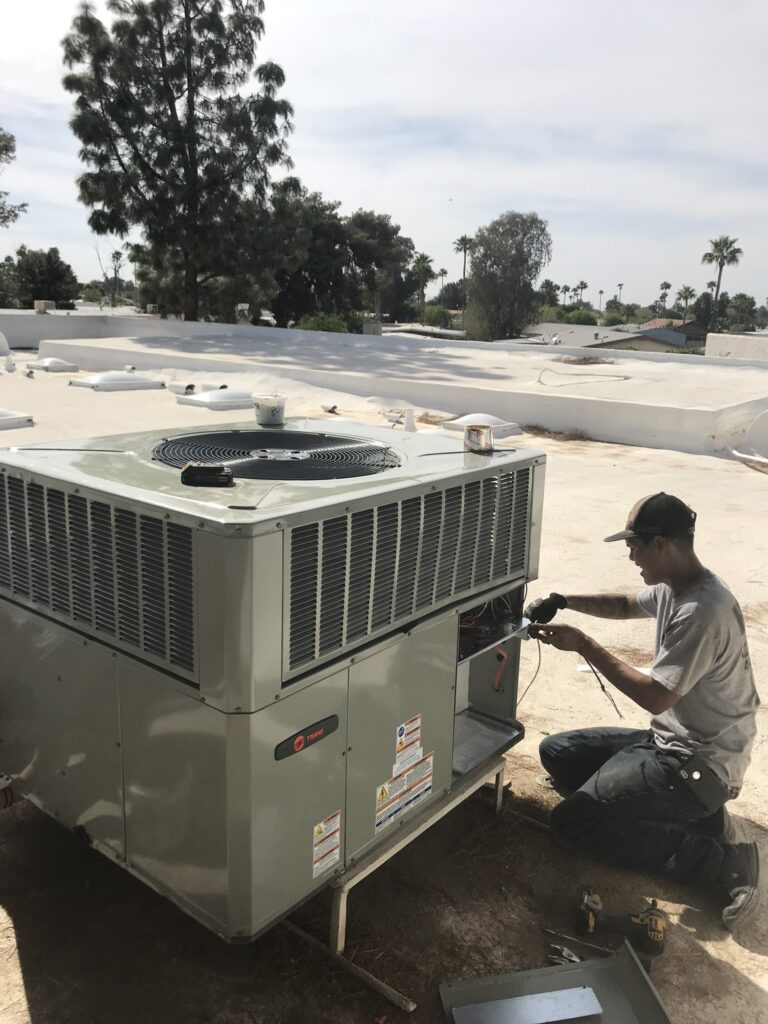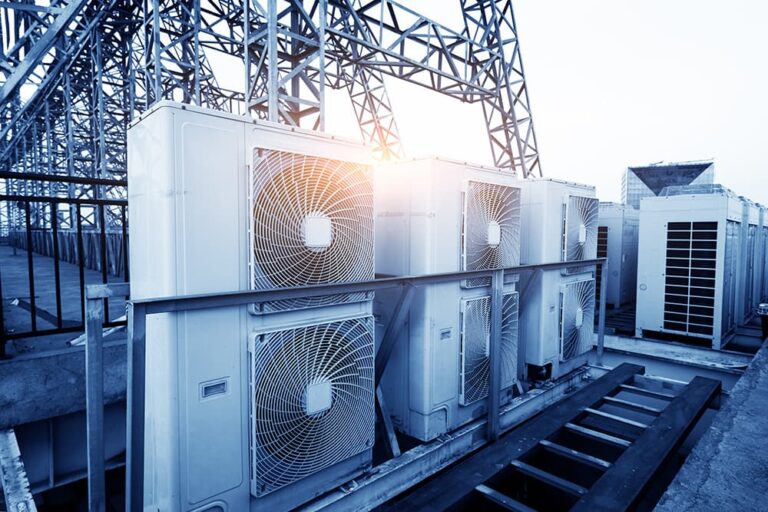Are HVAC Maintenance Contracts Worth the Money?
Heating, ventilation, and air conditioning (HVAC) systems play a crucial role in maintaining comfortable indoor environments. Regular maintenance is essential to ensure these systems operate efficiently and last longer.
An HVAC service contract is a formal agreement between a customer and an HVAC service provider that outlines the terms for regular maintenance and emergency services. This article will explore whether such contracts provide good value for homeowners and businesses.
We’ll examine how these agreements work, their typical inclusions, and the potential benefits, such as improved system efficiency and extended equipment lifespan.
Key Takeaways
- Understand the components of an HVAC service contract.
- Learn how regular maintenance can improve system efficiency.
- Discover the potential cost savings of maintenance contracts.
- Evaluate the financial implications of contracting versus as-needed service calls.
- Determine if an HVAC maintenance contract is right for your situation.
Understanding HVAC Maintenance Contracts

Understanding the details of HVAC maintenance contracts can help homeowners make informed decisions about their heating and cooling systems. Regular tune-ups are essential to keep your HVAC system running smoothly.
What Is an HVAC Maintenance Contract?
An HVAC maintenance contract is an agreement between a homeowner and an HVAC service provider to perform regular maintenance on the heating and cooling systems. These contracts typically include seasonal maintenance visits, usually in the fall and spring, to ensure the system is ready for peak usage periods.
Common Elements in Service Agreements
Most HVAC service agreements share certain common elements. These include:
- Bi-annual maintenance visits to inspect and tune-up the system.
- Thorough system inspections, filter replacements, and cleaning of key components.
- Priority scheduling for service calls, ensuring contract holders receive prompt attention during busy seasons.
- Emergency service provisions, often with 24/7 response capabilities for critical system failures.
- Some premium agreements may include parts coverage or discounted rates on repairs and replacement components.
For more detailed information on what to expect from an HVAC maintenance plan, you can visit this resource to learn about the costs associated with such plans.
Key HVAC Maintenance Contract Benefits
HVAC maintenance contracts offer a multitude of benefits that can enhance the overall performance and longevity of your heating and cooling system. By investing in regular maintenance, homeowners can enjoy a range of advantages that improve their system’s functionality and overall value.
Improved System Efficiency and Lower Energy Bills
Regular maintenance is crucial for maintaining your HVAC system’s efficiency. A well-maintained system consumes less energy, leading to lower utility bills. Technicians inspect and clean critical components, ensuring that your system operates at peak performance. This not only saves you money but also reduces your environmental footprint.
Extended Equipment Lifespan
Preventive care is essential for extending the lifespan of your HVAC equipment. Regular inspections allow technicians to identify and address minor issues before they escalate into major problems. By addressing wear and tear proactively, you can avoid premature replacements and get the most out of your investment.
- Regular tune-ups help prevent component failure.
- Maintenance tasks, such as cleaning and lubricating parts, reduce wear and tear.
- Technicians can identify potential issues before they become major problems.
Prevention of Costly Emergency Repairs
One of the biggest advantages of an HVAC maintenance agreement is the preventive care it provides. By identifying minor issues early, you can avoid costly HVAC repairs down the line. Emergency HVAC service calls typically cost 25-50% more than scheduled maintenance visits, with even higher premiums for after-hours, weekend, or holiday service.
Some common issues that can be prevented with regular maintenance include:
- Clogged filters or worn-out belts causing overheating and system stress.
- Dirty coils leading to compressor failure.
- Clogged condensate lines causing water damage.
What’s Typically Included in HVAC Service Agreements

A typical HVAC service agreement encompasses a range of services aimed at maintaining the efficiency and longevity of the system. These agreements are designed to provide homeowners with peace of mind and protect their investment in heating, ventilation, and air conditioning systems.
Standard Maintenance Services
Standard maintenance services under an HVAC service agreement often include routine inspections and cleaning of critical components. This may involve checking and replacing air filters, inspecting electrical connections, and ensuring that all mechanical parts are in good working order. Regular inspections help identify potential issues before they become major problems, thereby preventing costly repairs down the line.
Optional Services and Add-ons
Beyond standard maintenance, many HVAC service providers offer optional services and add-ons to enhance the performance and longevity of HVAC systems. These may include indoor air quality services such as duct cleaning and sanitization, as well as the installation of advanced filtration systems. Some agreements may also cover the replacement of specific parts or offer discounts on more substantial repairs.
| Service Type | Description | Benefits |
|---|---|---|
| Routine Inspections | Checking system components and performance | Early detection of potential issues |
| Duct Cleaning | Removing debris and contaminants from ductwork | Improved indoor air quality |
| Parts Replacement | Replacing worn or faulty components | Maintaining system efficiency and performance |
The Real Cost of HVAC Maintenance Contracts
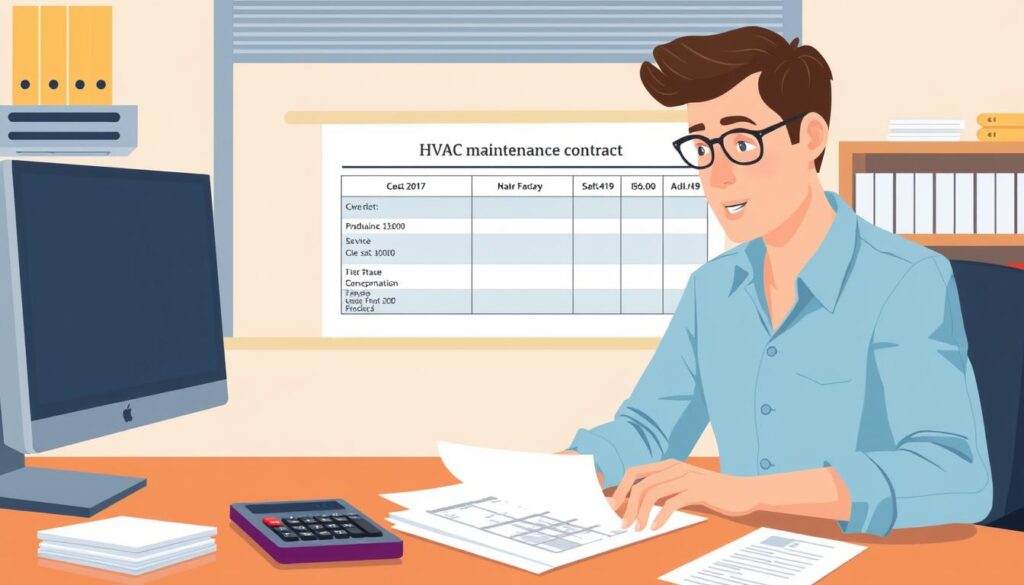
Understanding the real cost of HVAC maintenance contracts is crucial for making informed decisions. Regular maintenance brings clear benefits, like improved energy efficiency, extended equipment lifespan, and better indoor air quality.
Average Price Ranges
The average cost of an HVAC maintenance contract can vary, but typically ranges from $200 to $500 annually. This cost can be a fraction of the average emergency HVAC repair, which can range from $300 to $1,500.
Factors Affecting Contract Pricing
Several factors affect the pricing of HVAC maintenance contracts, including the size and type of the HVAC system, the terms and coverage provided, and the level of service required. By understanding these factors, homeowners can make informed pricing choices that fit their needs and budgets.
Cost vs. Value Analysis
When evaluating the cost of an HVAC maintenance contract, it’s essential to consider the value it provides. Energy savings from well-maintained systems can range from 5-15% on monthly utility bills, potentially recovering a significant portion of the maintenance contract cost. Additionally, extended equipment lifespan can defer replacement costs of $5,000-$10,000 by several years, representing substantial long-term savings. By choosing the right contract, homeowners can save money and enjoy the convenience of priority service and scheduled maintenance.
How to Choose the Right HVAC Service Provider
The key to maximizing your HVAC system’s performance lies in selecting a reliable service provider. With so many companies offering HVAC maintenance contracts, it’s essential to evaluate your options carefully.
Evaluating Certifications and Experience
When choosing an HVAC service provider, look for technicians with relevant certifications and experience. This ensures that they have the necessary skills to maintain and repair your system effectively.
Checking Reviews and Reputation
Research the reputation of potential HVAC companies by reading online reviews and asking for referrals from friends or family. A provider with a good reputation is more likely to offer reliable service.
Comparing Contract Terms and Flexibility
Compare the contract terms and flexibility offered by different providers. Consider factors such as scheduling options, response times for emergency calls, and the availability of tiered service plans that can be customized to your needs.
To make an informed decision, request detailed written contracts from multiple providers and compare the services included, excluded, and available as add-ons. Evaluate the flexibility of scheduling options and assess whether the provider offers customized coverage based on your system’s age and your budget constraints. Consider the company’s payment options, including monthly payment plans and discounts for prepaying annually. By carefully evaluating these factors, you can choose a reliable HVAC service provider that meets your needs and ensures your system operates efficiently.
Negotiating and Customizing Your HVAC Service Contract

Negotiating and customizing your HVAC service contract can significantly impact the overall value you receive from the agreement. A tailored contract ensures that you get the necessary services without paying for unnecessary features.
Tailoring Services to Your Specific Needs
To maximize the benefits of your HVAC service contract, it’s essential to tailor the services to your specific needs. This involves assessing your HVAC system’s requirements and identifying the services that are most critical to its maintenance and performance. By doing so, you can avoid paying for generic services that may not be relevant to your situation.
For instance, if you have a complex HVAC system, you may require more frequent maintenance visits or specialized services. In such cases, you should negotiate with your service provider to include these services in your contract.
Understanding Cancellation Policies and Renewal Terms
It’s equally important to understand the cancellation policies and renewal terms of your HVAC service contract. You should carefully review the contract language regarding cancellation fees, notice periods, and any penalties for early termination. Some contracts may allow you to cancel at any time with little to no fee, while others may have restrictions or charge a percentage of the remaining contract value.
- Review the automatic renewal process, including notification periods and any changes to pricing or terms.
- Negotiate for pro-rated refunds if you need to cancel mid-contract due to circumstances like moving or replacing your HVAC system.
- Clarify how price increases are determined and communicated for multi-year agreements.
By understanding these terms, you can make informed decisions about your HVAC service contract and avoid potential pitfalls.
Common Issues with HVAC Maintenance Contracts
Several challenges are associated with HVAC maintenance contracts that homeowners should be aware of. While these contracts are designed to provide peace of mind and prevent costly repairs, certain issues can arise that detract from their overall value.
Misunderstandings About Coverage
One common issue is the misunderstanding about what is covered under the contract. Homeowners may assume that all repairs are included, only to discover that certain parts or services are not covered. This can lead to unexpected expenses and frustration.
Clear communication about the terms and conditions of the contract is crucial to avoid such misunderstandings. It’s essential to review the contract carefully and ask questions before signing.
Service Quality and Response Time Concerns
Another issue is related to the quality of service and response times. Some homeowners report inconsistent technician quality, with different personnel visiting each time. This can be problematic, especially during emergency situations when prompt and reliable service is critical.
- Response time disappointments are common during peak seasons, even for customers with “priority service.”
- Some maintenance visits are reported to be rushed or superficial, with technicians spending insufficient time on thorough system inspection and cleaning.
- Communication breakdowns regarding appointment scheduling and service completion are frequently cited issues.
To mitigate these issues, it’s vital to ensure clear communication and set expectations for turnaround times. Homeowners should also inquire about the flexibility in scheduling options, such as evening or weekend appointments.
Making the Smart Decision for Your Home and Budget
Understanding the benefits and costs of HVAC maintenance contracts is crucial for making a decision that suits your home and budget. When deciding on an HVAC service contract, it’s vital to consider several factors that impact your decision.
First, evaluate your HVAC system’s age and condition. Newer systems under warranty may require only basic maintenance, while aging equipment benefits from more comprehensive service agreements. This assessment will help you determine the level of maintenance needed.
Consider your personal comfort with handling unexpected repair costs versus paying predictable maintenance fees. Homeowners have varying risk tolerance, so it’s essential to factor this into your decision. Additionally, think about your home’s occupancy patterns and the importance of uninterrupted HVAC operation. Households with elderly members, young children, or medical needs may place a higher value on preventative regular maintenance and emergency service guarantees.
In the long run, regular maintenance can lead to significant savings through extended equipment life and improved energy efficiency. Calculate these potential long-term savings against the cumulative cost of maintenance contracts over several years. Remember that peace of mind has real value; knowing that professionals are regularly inspecting your system and are available for emergency service provides security that many homeowners find worth the investment.
Ultimately, the decision should balance financial considerations with your specific home needs, system requirements, and personal priorities regarding comfort, convenience, and risk management. By carefully evaluating these factors, you can make an informed decision about whether an HVAC maintenance contract is right for you.

